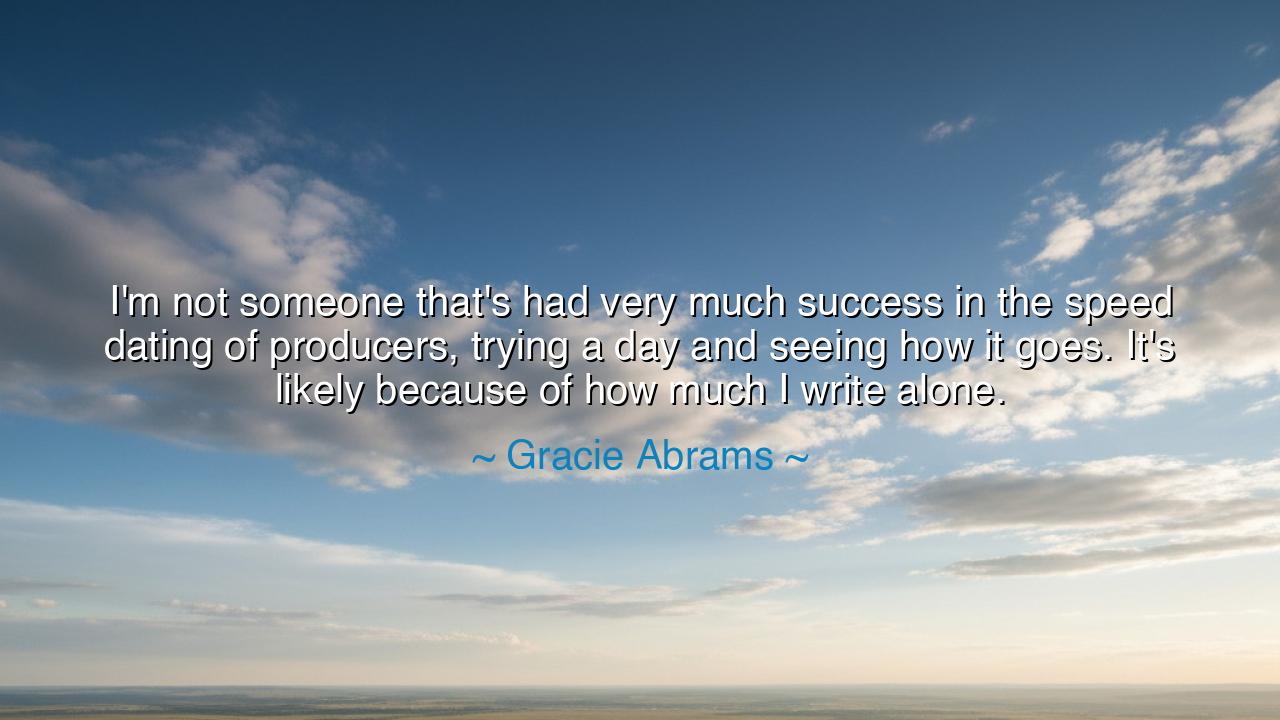
I'm not someone that's had very much success in the speed dating
I'm not someone that's had very much success in the speed dating of producers, trying a day and seeing how it goes. It's likely because of how much I write alone.






In the words of Gracie Abrams, a young artist whose songs carry the trembling honesty of the human heart, we find a truth both tender and profound: “I'm not someone that's had very much success in the speed dating of producers, trying a day and seeing how it goes. It's likely because of how much I write alone.” Beneath her gentle tone lies a timeless revelation about creativity, solitude, and the sacred bond between artist and art. In an age where collaboration is hurried, and creation is often treated as transaction, Gracie speaks for the ancient spirit of the solitary maker—the one who crafts in silence, who waits for inspiration like a sacred visitor rather than chasing it in haste.
Her words remind us that art, like love, cannot be rushed. The phrase “speed dating of producers” evokes an image both modern and mournful: a world where even creativity is tested in quick encounters, where people meet not to understand, but to evaluate. Yet Gracie, whose strength lies in writing alone, resists this rhythm. She is of the lineage of those who understand that true creation springs from intimacy with one’s own soul, not from the noise of convenience. The ancients would say that the muse visits not those who shout for her attention, but those who sit quietly in faith and longing, ready to receive her whisper.
In this, her struggle mirrors that of the great poet Sappho of Lesbos, who wrote her verses in solitude, pouring the depths of her longing and perception into fragile lines of lyric fire. While others sought fame in public recitation, Sappho turned inward, writing not for applause, but for truth. So too does Gracie Abrams find her power in stillness. For her, the act of writing alone is not isolation, but communion—with emotion, memory, and sound. It is in solitude that the song begins to take form, untainted by the expectations of others.
And yet, her words reveal the tension between the modern and the eternal. In today’s world, creation is often bound to collaboration, to studios and schedules, to the rhythm of industry rather than the rhythm of inspiration. Gracie Abrams acknowledges this, and still she honors her nature. She is like a gardener who refuses to force the flower to bloom; she waits, she listens, she writes until her truth takes shape. Her refusal of speed, her lack of “success” in quick collaboration, is not failure—it is integrity. For true art does not emerge from convenience, but from authenticity.
The ancients would have understood this instinct well. Leonardo da Vinci, though surrounded by courts and commissions, often vanished into solitude, leaving works unfinished because his heart could not move faster than his vision. He wrote that “art is never finished, only abandoned,” and in those words lies the same spirit as Gracie’s: a refusal to create on command, a reverence for the slow unfolding of expression. Both knew that haste wounds the soul of creation, turning what is divine into mere craft.
There is wisdom, too, in her self-awareness. She does not scorn collaboration—she merely recognizes that her artistry grows from stillness. Like the monastic scribes of old who copied sacred texts by candlelight, she honors the sacred act of listening inward. For every artist must come to know their own rhythm: some create in chorus, others in solitude. The tragedy of the modern world is that it praises noise and speed, forgetting that silence and patience are the true midwives of greatness.
The lesson in Gracie Abrams’s words is this: do not measure your success by the pace or pattern of others. Whether you are an artist, a thinker, or a dreamer, honor the way your spirit moves. Do not rush to connect for the sake of approval, nor abandon your solitude out of fear. The greatest works—the songs that heal, the words that endure—are born not from the crowd but from the quiet heart that dares to wait.
So, dear listener, learn from her example. In your craft, in your love, in your becoming—slow down. Trust the rhythm of your own creation. Let solitude be your teacher, not your enemy. For while others chase opportunity in haste, the one who writes alone may find, in time, something rarer than success: the voice of truth, clear and undiluted, rising from the depths of the soul.






AAdministratorAdministrator
Welcome, honored guests. Please leave a comment, we will respond soon